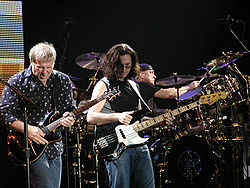| Artist | Song title | Date | Highest position
on US charts | Highest position
on UK charts | Highest position
on R&B charts | Miscellaneous |
|---|
| Bill Justis | "Raunchy" | 1957 | #3 | #24 | #1 | |
| Ernie Freeman | "Raunchy" | 1957 | #4 [7] | #1 [8] | | |
| The Champs | "Tequila" | 1958 | #1 | #5 | #1 | |
| Duane Eddy | "Moovin' N' Groovin'" | 1958 | #72 | | | |
| The Champs | "El Rancho Rock" | 1958 | #30 | | | |
| Link Wray & His Ray Men | "Rumble" | 1958 | #16 | | #11 | |
| Duane Eddy | "Rebel Rouser" | 1958 | #6 | #8 | #19 | |
| Duane Eddy | "Ramrod" | 1958 | #28 | | | |
| The Champs | "Chariot Rock" | 1958 | #59 | | | |
| Duane Eddy | "Cannonball" | 1958 | #15 | #2 | #22 | |
| Link Wray & His Ray Men | "Raw-Hide" | 1959 | #23 | | | |
| The Rockin' R's | "The Beat" | 1959 | #57 | | | |
| Duane Eddy | "Yep!" | 1959 | #30 | #17 | | |
| The Virtues | "Guitar Boogie Shuffle" | 1959 | #5 | | #27 | |
| Dave "Baby" Cortez | "The Happy Organ" | 1959 | #1 | | #5 | |
| Johnny and the Hurricanes | "Crossfire" | 1959 | #23 | | | |
| The Wailers | "Tall Cool One" | 1959 | #36 | | #24 | |
| Preston Epps | "Bongo Rock" | 1959 | #14 | | | |
| Duane Eddy | "Forty Miles of Bad Road" | 1959 | #9 | | #17 | |
| Johnny and the Hurricanes | "Red River Rock" | 1959 | #5 | #3 | #5 | |
| The Wailers | "Mau-Mau" | 1959 | #68 | | | |
| Sandy Nelson | "Teen Beat" | 1959 | #4 | #9 | #17 | The piano on the recording is by Bruce Johnston. |
| Santo & Johnny | "Sleep Walk" | 1959 | #1 | #22 | #4 | |
| Santo & Johnny | "Tear Drop" | 1959 | #23 | #50 | #17 | |
| Duane Eddy | "Some Kind-A Earthquake" | 1959 | #37 | #12 | | |
| Johnny And The Hurricanes | "Reveille Rock" | 1959 | #25 | | #17 | |
| The Fireballs | "Bulldog" | 1960 | #24 | | | |
| The Champs | "Too Much Tequila" | 1960 | #30 | | | |
| Johnny and the Hurricanes | "Beatnik Fly" | 1960 | #15 | #8 | | |
| Bill Black's Combo | "White Silver Sands" | 1960 | #9 | #33 | #1 | |
| Bill Black's Combo | "Don't Be Cruel" | 1960 | #11 | #32 | #1 | |
| Duane Eddy | "Shazam" | 1960 | #45 | #4 | | |
| Duane Eddy | "Because They're Young" | 1960 | #4 | #2 | #17 | |
| Johnny and the Hurricanes | "Rocking Goose" | 1960 | #60 | #3 | | |
| Duane Eddy | "Peter Gunn" | 1960 | #8 | #6 | | This was the second charting of the song in 1959. |
| Floyd Cramer | "Last Date" | 1960 | #2 | #32 | | |
| The Shadows | "Apache" | 1960 | | #1 | | |
| The Shadows | "Man of Mystery" | 1960 | | #5 | | |
| The Ventures | "Walk, Don't Run" | 1960 | #1 | #8 | #13 | |
| Paul Revere & the Raiders | "Like, Long Hair" | 1960 | #38 [42] | | | |
| Duane Eddy | "Pepe" | 1961 | #18 | #2 | | |
| B. Bumble and the Stingers | "Bumble Boogie" | 1961 | #21 | | | |
| The Fireballs | "Quite a Party" | 1961 | #27 | #29 | | |
| Kokomo | "Asia Minor" | 1961 | #8 | | #35 | Adopted from the Edvard Grieg, Piano Concerto in A minor and subsequently banned by the BBC. [47] |
| The Mar-Keys | "Last Night" | 1961 | #3 | #2 | | |
| Sandy Nelson | "Let There Be Drums" | 1961 | #7 | #3 | | |
| The Shadows | "F.B.I." | 1961 | | #6 | | |
| The Shadows | "The Frightened City" | 1961 | | #3 | | |
| The Shadows | "Kon-Tiki" | 1961 | | #1 | | |
| The Shadows | "The Savage" | 1961 | | #10 | | |
| The String-A-Longs | "Wheels" | 1961 | #3 | #8 | #19 | |
| Billy Joe and the Checkmates | "Percolator (Twist)" | 1962 | #10 | | | |
| The Champs | "Limbo Rock" | 1962 | #40 | | | |
| Jet Harris | "Besame Mucho" | 1962 | | #22 | | |
| King Curtis | "Soul Twist" | 1962 | #17 | | #1 | |
| Sandy Nelson | "Drums Are My Beat" | 1962 | #29 | #30 | | |
| The Shadows | "Wonderful Land" | 1962 | | #1 | | |
| The Shadows | "Guitar Tango" | 1962 | | #4 | | |
| The Shadows | "Dance On!" | 1962 | | #1 | | |
| The Tornados | "Telstar" | 1962 | #1 | #1 | #5 | |
| Booker T. & the M.G.'s | "Green Onions" | 1962 | #3 | | #1 | |
| The Busters | "Bust Out" | 1963 | #25 | | | |
| The Dakotas | "The Cruel Sea" | 1963 | | #18 | | |
| Jet Harris and Tony Meehan | "Scarlett O'Hara" | 1963 | | #2 | | |
| Lonnie Mack | "Memphis" | 1963 | #5 | | #4 | |
| Lonnie Mack | Wham! | 1963 | #24 | | | From the album The Wham of that Memphis Man |
| The Marketts | "Out of Limits" | 1963 | #3 | | | |
| Link Wray & His Ray Men | "Jack The Ripper" | 1963 | #64 | | | Released in 1961, but didn't chart until 1963. |
| Jack Nitzsche | "The Lonely Surfer" | 1963 | #39 | | | |
The Rockin' Rebels
aka The Rebels | "Wild Weekend" | 1963 | #8 | #3 | #28 | |
| The Shadows | "Foot Tapper" | 1963 | | #1 | | |
| The Surfaris | "Wipe Out" | 1963 | #2 | #5 | #10 | |
| The Pyramids | "Penetration" | 1964 | #18 | | | Adapted from Edvard Grieg's Piano Concerto in A minor. |
| The T-Bones | "No Matter What Shape (Your Stomach's In)" | 1965 | #3 | | | |
| The Viscounts | "Harlem Nocturne" | 1966 | #39 | | #17 | Originally released in 1960, peaking at #52 on Billboard and #28 on CashBox. A 1965 re-release resulted in the record topping its previous peak, reaching #39. |
| The Bar-Kays | "Soul Finger" | 1967 | #17 | #33 | #3 | |
| Cliff Nobles & Co. | "The Horse" | 1968 | #2 | #2 | | |
| Fleetwood Mac | "Albatross" | 1968 | | #1 | | Charted again (#2) in Britain in 1972. |
| Hugh Masekela | "Grazing in the Grass" | 1968 | #1 | | #1 | |
| Mason Williams | "Classical Gas" | 1968 | #2 | | #9 | "orchestrated rock and roll" backed by the Wrecking Crew [81] |
| Booker T. & the M.G.'s | "Time Is Tight" | 1969 | #6 | | #7 | from the film Uptight |
| The Ventures | "Hawaii Five-O" | 1969 | #4 [83] | | | |
































